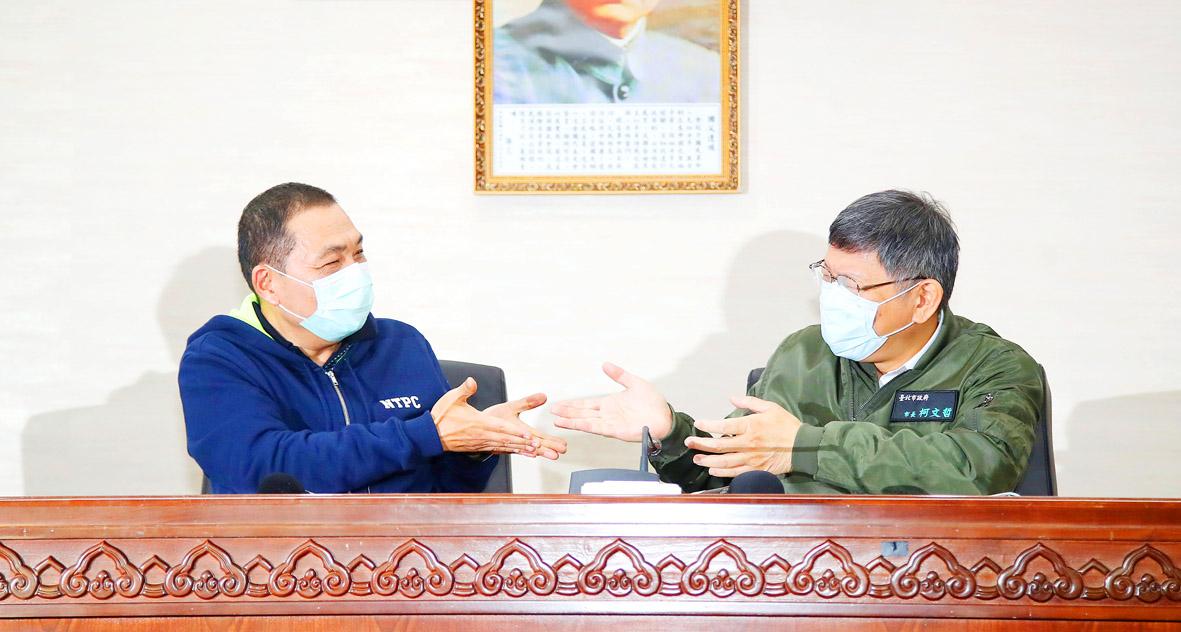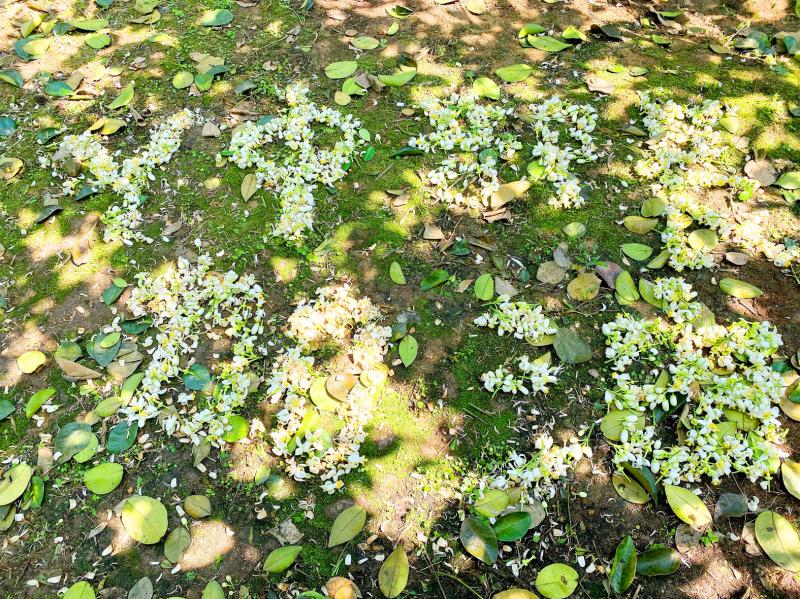Taipei Mayor Ko Wen-je (柯文哲) and New Taipei City Mayor Hou You-yi (侯友宜) yesterday pledged at an annual meeting of the cities’ leaders to provide mutual medical services and further collaboration on COVID-19 prevention, denying that their prevention strategies are inconsistent, despite media reports.
Disease prevention should be predicated on the “best preparations for worst-case scenarios,” and the New Taipei City Government has followed the All-out Defense Mobilization Readiness Act (全民防衛動員準備法) in taking precautions allowing it to act decisively if a city lockdown is ordered by the central government, Hou, a former police officer, said on Wednesday.
Ko, a physician and the chairman of the Taiwan People’s Party, said that the Taipei City Government has also taken precautionary measures, but that such measures should not get “too far” ahead of the present coronavirus situation.

Photo: CNA
Their remarks triggered speculation that the two cities might be diverging on disease-prevention policy.
At yesterday’s meeting, the two mayors constantly applauded each other, vowing to work together to stop the virus’ spread.
The cities are considering a trial of mask dispenser machines and would not let each other’s borders stop them from providing medical treatment, Ko said, adding that the two plan to set up shared locations for isolating COVID-19 patients.

Photo: Yu Chao-fu, Taipei Times
“The two cities are a body of life and there is no problem with inconsistency,” Hou said, adding that he is working closely with Ko on prevention strategies.
A hotline has been set up so that the mayors can handle any emergency, Hou said.
Taipei City Deputy Mayor Vivian Huang (黃珊珊) said that each city notifies the other about any coronavirus-related information so that officials stay informed.
Asked about his party’s suggestion that Premier Su Tseng-chang (蘇貞昌) take over from Minister of Health and Welfare Chen Shih-chung (陳時中) as head of the Central Epidemic Command Center, Ko said the move was not necessary.
Su and Chen should communicate and arrive at a consensus regarding policies, Ko added.
Local media and commentators often compare Chen and Ko, both medical professionals.
While Chen is gaining popularity for his professionalism and pragmatism as the center’s head, Ko has drawn criticism for frequent slips of the tongue. The two have butted heads over the best way to evacuate Taiwanese citizens after the lockdown in Wuhan, China, is lifted.
Ko said that the government should focus on the work at hand and not waste time on a meaningless war of words.
Hou said that New Taipei City would follow the central government’s guidance on disease prevention, adding that the two city leaders are shoulder-to-shoulder on that issue.
Separately, Huang said that the Taipei City Government is considering a special scheme that would hire volunteers to help with home quarantines.
“Local borough wardens and district offices are swamped,” Huang said, adding that she would discuss the project with the Taipei Civil Affairs Bureau while waiting for guidance from the central government.

Alain Robert, known as the "French Spider-Man," praised Alex Honnold as exceptionally well-prepared after the US climber completed a free solo ascent of Taipei 101 yesterday. Robert said Honnold's ascent of the 508m-tall skyscraper in just more than one-and-a-half hours without using safety ropes or equipment was a remarkable achievement. "This is my life," he said in an interview conducted in French, adding that he liked the feeling of being "on the edge of danger." The 63-year-old Frenchman climbed Taipei 101 using ropes in December 2004, taking about four hours to reach the top. On a one-to-10 scale of difficulty, Robert said Taipei 101

A preclearance service to facilitate entry for people traveling to select airports in Japan would be available from Thursday next week to Feb. 25 at Taiwan Taoyuan International Airport, Taoyuan International Airport Corp (TIAC) said on Tuesday. The service was first made available to Taiwanese travelers throughout the winter vacation of 2024 and during the Lunar New Year holiday. In addition to flights to the Japanese cities of Hakodate, Asahikawa, Akita, Sendai, Niigata, Okayama, Takamatsu, Kumamoto and Kagoshima, the service would be available to travelers to Kobe and Oita. The service can be accessed by passengers of 15 flight routes operated by

Taiwanese and US defense groups are collaborating to introduce deployable, semi-autonomous manufacturing systems for drones and components in a boost to the nation’s supply chain resilience. Taiwan’s G-Tech Optroelectronics Corp subsidiary GTOC and the US’ Aerkomm Inc on Friday announced an agreement with fellow US-based Firestorm Lab to adopt the latter’s xCell, a technology featuring 3D printers fitted in 6.1m container units. The systems enable aerial platforms and parts to be produced in high volumes from dispersed nodes capable of rapid redeployment, to minimize the risk of enemy strikes and to meet field requirements, they said. Firestorm chief technology officer Ian Muceus said

MORE FALL: An investigation into one of Xi’s key cronies, part of a broader ‘anti-corruption’ drive, indicates that he might have a deep distrust in the military, an expert said China’s latest military purge underscores systemic risks in its shift from collective leadership to sole rule under Chinese President Xi Jinping (習近平), and could disrupt its chain of command and military capabilities, a national security official said yesterday. If decisionmaking within the Chinese Communist Party has become “irrational” under one-man rule, the Taiwan Strait and the regional situation must be approached with extreme caution, given unforeseen risks, they added. The anonymous official made the remarks as China’s Central Military Commission Vice Chairman Zhang Youxia (張又俠) and Joint Staff Department Chief of Staff Liu Zhenli (劉振立) were reportedly being investigated for suspected “serious